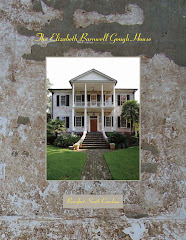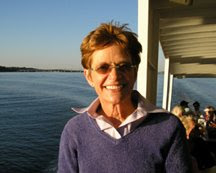.jpg)
John Barnwell was by all accounts a heroic leader in battle, an adept statesman on both sides of the Atlantic and a visionary who helped secure the future of fledgling Beaufort. A skilled mapmaker in uncharted lands, John Barnwell literally and figuratively put Beaufort on the map. He also founded a family that would increasingly dominate Beaufort politically, socially and economically with each succeeding generation.
For more than 130 years after his death, Tuscarora Jack’s exceptional personality and spirit lived on in his descendents – as they, in turn, helped to mold the history of Beaufort.Born in Ireland to a well-connected, titled family of Barons, Baronets and Viscounts, Barnwell left for Charleston (then Charles Town) to seek his fortune around 1700. Founded only 30 years before, the once tenuous toehold in the New World had become a bustling port prospering from the cultivation of rice. Barnwell quickly established himself, serving first as Clerk of the Governor’s Council, later as Deputy Secretary of the Council and ultimately as Comptroller of the Province.
Governor Sir Nathaniel Johnson (for whom Barnwell would name his first son) was one of his early patrons. In the years leading up to 1709, Barnwell was favored with a series of land grants on Port Royal and vicinity for holdings totaling over 3,400 acres. His first contact with the area, where he would play an even more prominent role, was in 1703, when he was directed to map Port Royal Sound. Often a part of expeditions against the Spanish and French, Barnwell continued to map the region, eventually making “the great mother map of the American southeast from which all subsequent maps of the area were made.”2
In 1711, his extensive military experience led to his being given the command of a party of militia and 500 Indians (predominantly Yemassee) sent against the powerful Tuscarora Indians who had been raiding English settlements in what is now North Carolina. Outnumbered, under provisioned, and contending with both poor discipline and bitter winter conditions, the expedition under Barnwell’s leadership nevertheless managed to rout the Tuscarora. The success of his mission and his status as Carolina’s most experienced Indian fighter earned him the epithet -- Tuscarora Jack.
His trusted allies the Yemassee, however, in just four years would turn against the English. For years, Barnwell and Port Royal neighbor, planter and Indian agent, Thomas Nairne, had warned that the official exploitive policy toward the Indians was pushing them toward revolt.Their warnings proved correct on Good Friday 1715 when the Yemassee together with Creeks, Choctaws and Catawbas struck first at Pocotaligo Town. Two, perhaps three, colonists escaped the massacre, fleeing to Barnwell’s plantation.
Alerted to the uprising, 300 colonists fled to Beaufort and crowded aboard a smuggling ship that had been seized and detained in the harbor. Among the passengers was Barnwell’s ten year old son Nathaniel. Over 400 settlers, though, were killed in the uprising among them Thomas Nairne. Once again Tuscarora Jack was pressed into service to lead forces against the Indians, this time to drive his former allies the Yemassee into Florida.
In 1717, John Barnwell was also appointed to the first Board of Commissioners who were assigned the task of reforming Indian policy. He was also given the additional responsibility of directing the defense of the colony from the Stono River to St. Augustine.Although the Yemassee were ultimately routed, the uprising helped to fuel the colonists’ dissatisfaction with their governing authority, the Lord Proprietors. Their lack of support for the defense of the colony and self-interested rule led the colonists to petition for direct rule by the crown. The emissary deemed to have the requisite expertise and experience to plead their case was Colonel John Barnwell.
Arriving in London in 1720, he met with the Board of Trade and Lords Justices and successfully argued for transfer of power over the Carolinas to the King. His second mission was to propose that a string of defensive forts be built along the southern frontier. The financially conservative Lords Justices approved the building of only one, on the Altamaha River. On returning to the Carolinas, Barnwell oversaw its construction. Named Fort King George, it was the first permanent English presence in Georgia.A member of the assembly from 1717 until his death in 1724, Barnwell also served as Justice of the Peace for Granville County and commander of the county militia.
A widower at the time of his death, he left two sons, six daughters and an estate of over 6,500 acres.A founding father of Beaufort, he was also the patriarch of a prolific family that prospered, married well and carried on his legacy of public service to become one of the most powerful of Beaufort families.
For more than 130 years after his death, Tuscarora Jack’s exceptional personality and spirit lived on in his descendents – as they, in turn, helped to mold the history of Beaufort.Born in Ireland to a well-connected, titled family of Barons, Baronets and Viscounts, Barnwell left for Charleston (then Charles Town) to seek his fortune around 1700. Founded only 30 years before, the once tenuous toehold in the New World had become a bustling port prospering from the cultivation of rice. Barnwell quickly established himself, serving first as Clerk of the Governor’s Council, later as Deputy Secretary of the Council and ultimately as Comptroller of the Province.
Governor Sir Nathaniel Johnson (for whom Barnwell would name his first son) was one of his early patrons. In the years leading up to 1709, Barnwell was favored with a series of land grants on Port Royal and vicinity for holdings totaling over 3,400 acres. His first contact with the area, where he would play an even more prominent role, was in 1703, when he was directed to map Port Royal Sound. Often a part of expeditions against the Spanish and French, Barnwell continued to map the region, eventually making “the great mother map of the American southeast from which all subsequent maps of the area were made.”2
In 1711, his extensive military experience led to his being given the command of a party of militia and 500 Indians (predominantly Yemassee) sent against the powerful Tuscarora Indians who had been raiding English settlements in what is now North Carolina. Outnumbered, under provisioned, and contending with both poor discipline and bitter winter conditions, the expedition under Barnwell’s leadership nevertheless managed to rout the Tuscarora. The success of his mission and his status as Carolina’s most experienced Indian fighter earned him the epithet -- Tuscarora Jack.
His trusted allies the Yemassee, however, in just four years would turn against the English. For years, Barnwell and Port Royal neighbor, planter and Indian agent, Thomas Nairne, had warned that the official exploitive policy toward the Indians was pushing them toward revolt.Their warnings proved correct on Good Friday 1715 when the Yemassee together with Creeks, Choctaws and Catawbas struck first at Pocotaligo Town. Two, perhaps three, colonists escaped the massacre, fleeing to Barnwell’s plantation.
Alerted to the uprising, 300 colonists fled to Beaufort and crowded aboard a smuggling ship that had been seized and detained in the harbor. Among the passengers was Barnwell’s ten year old son Nathaniel. Over 400 settlers, though, were killed in the uprising among them Thomas Nairne. Once again Tuscarora Jack was pressed into service to lead forces against the Indians, this time to drive his former allies the Yemassee into Florida.
In 1717, John Barnwell was also appointed to the first Board of Commissioners who were assigned the task of reforming Indian policy. He was also given the additional responsibility of directing the defense of the colony from the Stono River to St. Augustine.Although the Yemassee were ultimately routed, the uprising helped to fuel the colonists’ dissatisfaction with their governing authority, the Lord Proprietors. Their lack of support for the defense of the colony and self-interested rule led the colonists to petition for direct rule by the crown. The emissary deemed to have the requisite expertise and experience to plead their case was Colonel John Barnwell.
Arriving in London in 1720, he met with the Board of Trade and Lords Justices and successfully argued for transfer of power over the Carolinas to the King. His second mission was to propose that a string of defensive forts be built along the southern frontier. The financially conservative Lords Justices approved the building of only one, on the Altamaha River. On returning to the Carolinas, Barnwell oversaw its construction. Named Fort King George, it was the first permanent English presence in Georgia.A member of the assembly from 1717 until his death in 1724, Barnwell also served as Justice of the Peace for Granville County and commander of the county militia.
A widower at the time of his death, he left two sons, six daughters and an estate of over 6,500 acres.A founding father of Beaufort, he was also the patriarch of a prolific family that prospered, married well and carried on his legacy of public service to become one of the most powerful of Beaufort families.
2Stephen Barnwell, The Story of an American Family, Marquette, 1969, page 5
Please note that the material in this blog is copyrighted. It is not to be reproduced without my specific written permission.
.jpg)
